Business Ethics Case Study: Analysis of Ethical Issues and Solutions
VerifiedAdded on 2020/04/29
|11
|2476
|100
Case Study
AI Summary
This case study analyzes a business ethics scenario involving unethical conduct, specifically corporate espionage, by a manager who hacked into a competitor's intranet to obtain confidential information. The assignment explores the ethical dilemmas faced by an employee, Michael, and the required steps he should take based on utilitarianism and virtue ethics. The analysis highlights the unethical behavior of the boss, the role of a whistleblower, and the importance of ethics in business. The case emphasizes how an ethical company attracts customers, employees, and investors, leading to increased revenue and long-term growth. The conclusion reinforces the need for ethical decision-making and its impact on a company's success.
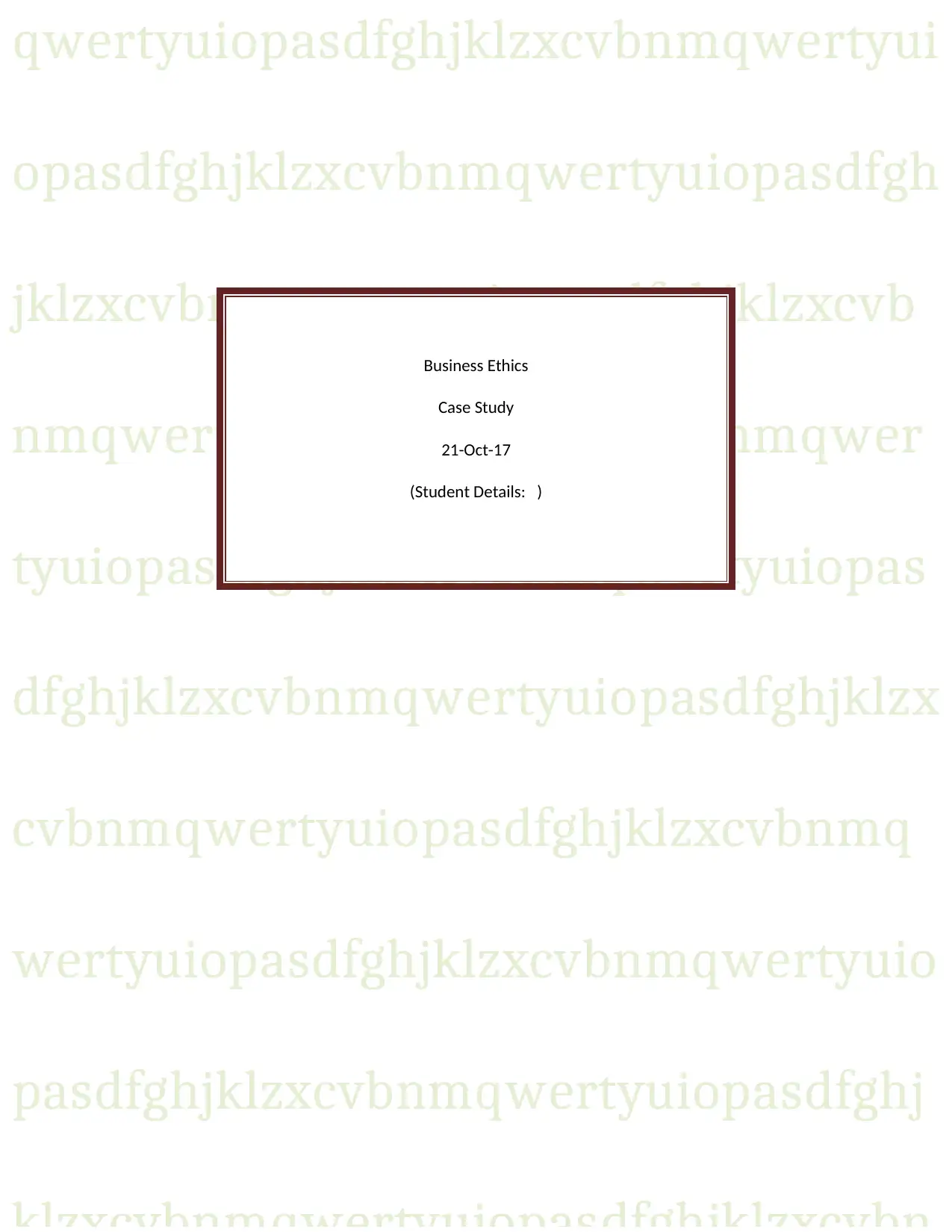
qwertyuiopasdfghjklzxcvbnmqwertyui
opasdfghjklzxcvbnmqwertyuiopasdfgh
jklzxcvbnmqwertyuiopasdfghjklzxcvb
nmqwertyuiopasdfghjklzxcvbnmqwer
tyuiopasdfghjklzxcvbnmqwertyuiopas
dfghjklzxcvbnmqwertyuiopasdfghjklzx
cvbnmqwertyuiopasdfghjklzxcvbnmq
wertyuiopasdfghjklzxcvbnmqwertyuio
pasdfghjklzxcvbnmqwertyuiopasdfghj
Business Ethics
Case Study
21-Oct-17
(Student Details: )
opasdfghjklzxcvbnmqwertyuiopasdfgh
jklzxcvbnmqwertyuiopasdfghjklzxcvb
nmqwertyuiopasdfghjklzxcvbnmqwer
tyuiopasdfghjklzxcvbnmqwertyuiopas
dfghjklzxcvbnmqwertyuiopasdfghjklzx
cvbnmqwertyuiopasdfghjklzxcvbnmq
wertyuiopasdfghjklzxcvbnmqwertyuio
pasdfghjklzxcvbnmqwertyuiopasdfghj
Business Ethics
Case Study
21-Oct-17
(Student Details: )
Paraphrase This Document
Need a fresh take? Get an instant paraphrase of this document with our AI Paraphraser
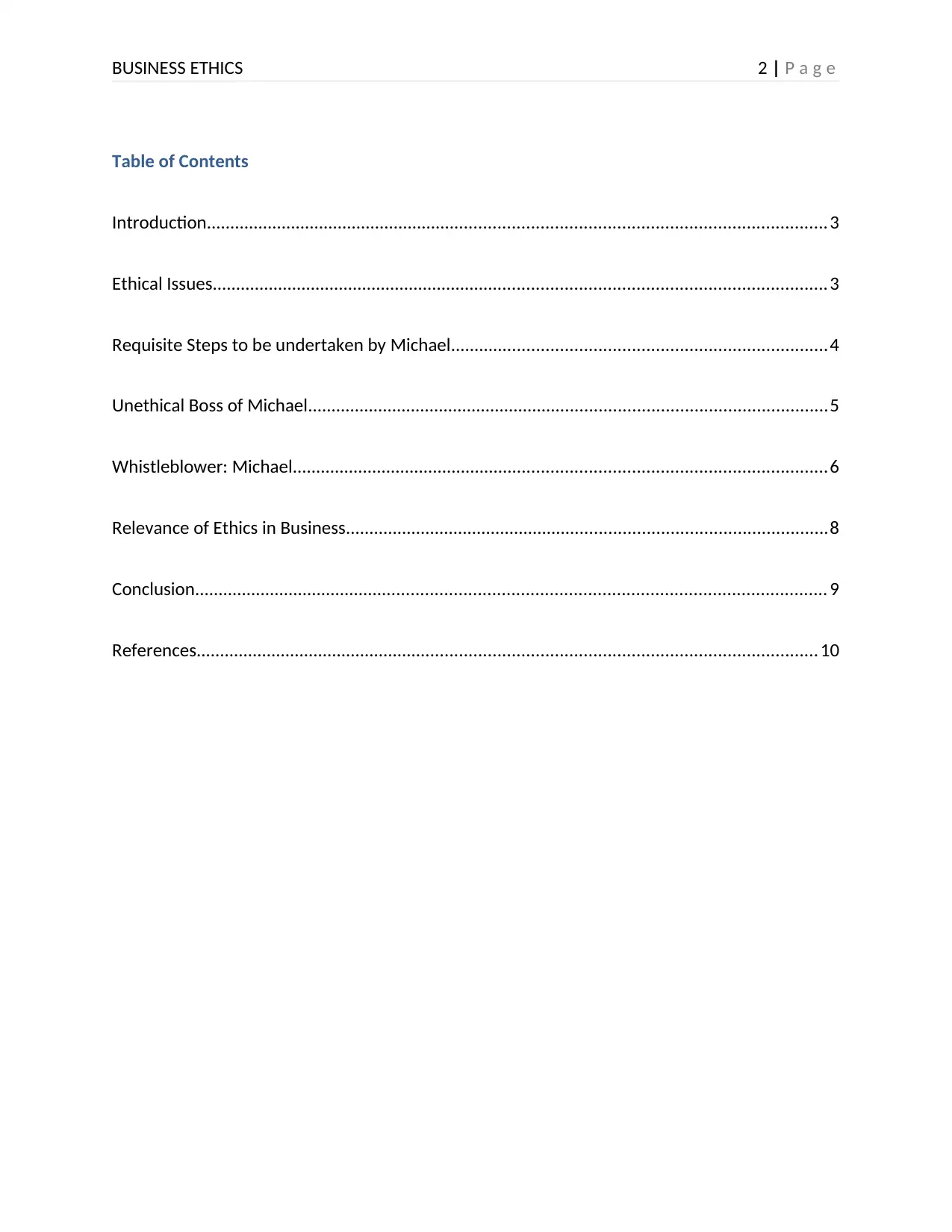
BUSINESS ETHICS 2 | P a g e
Table of Contents
Introduction...................................................................................................................................3
Ethical Issues..................................................................................................................................3
Requisite Steps to be undertaken by Michael...............................................................................4
Unethical Boss of Michael..............................................................................................................5
Whistleblower: Michael.................................................................................................................6
Relevance of Ethics in Business......................................................................................................8
Conclusion..................................................................................................................................... 9
References................................................................................................................................... 10
Table of Contents
Introduction...................................................................................................................................3
Ethical Issues..................................................................................................................................3
Requisite Steps to be undertaken by Michael...............................................................................4
Unethical Boss of Michael..............................................................................................................5
Whistleblower: Michael.................................................................................................................6
Relevance of Ethics in Business......................................................................................................8
Conclusion..................................................................................................................................... 9
References................................................................................................................................... 10
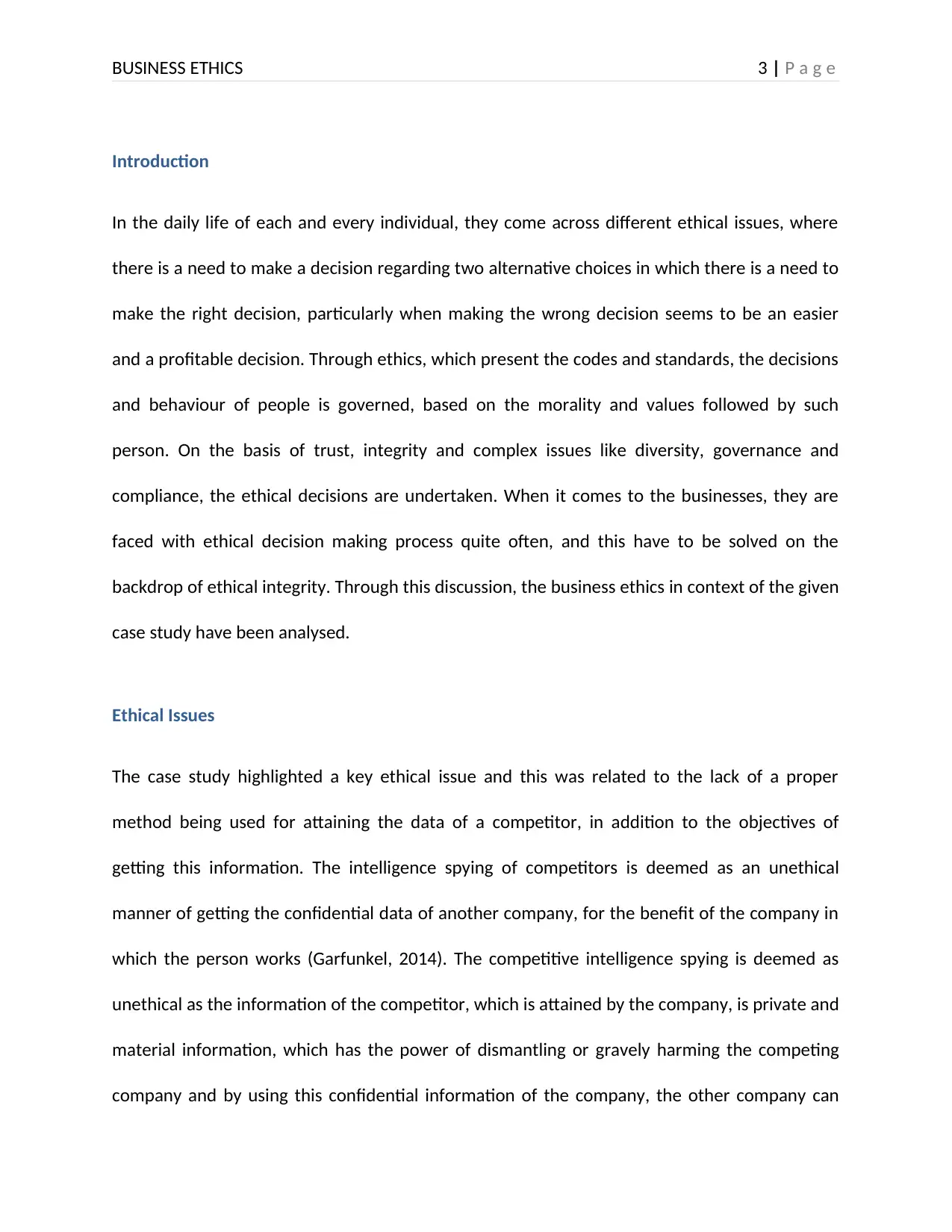
BUSINESS ETHICS 3 | P a g e
Introduction
In the daily life of each and every individual, they come across different ethical issues, where
there is a need to make a decision regarding two alternative choices in which there is a need to
make the right decision, particularly when making the wrong decision seems to be an easier
and a profitable decision. Through ethics, which present the codes and standards, the decisions
and behaviour of people is governed, based on the morality and values followed by such
person. On the basis of trust, integrity and complex issues like diversity, governance and
compliance, the ethical decisions are undertaken. When it comes to the businesses, they are
faced with ethical decision making process quite often, and this have to be solved on the
backdrop of ethical integrity. Through this discussion, the business ethics in context of the given
case study have been analysed.
Ethical Issues
The case study highlighted a key ethical issue and this was related to the lack of a proper
method being used for attaining the data of a competitor, in addition to the objectives of
getting this information. The intelligence spying of competitors is deemed as an unethical
manner of getting the confidential data of another company, for the benefit of the company in
which the person works (Garfunkel, 2014). The competitive intelligence spying is deemed as
unethical as the information of the competitor, which is attained by the company, is private and
material information, which has the power of dismantling or gravely harming the competing
company and by using this confidential information of the company, the other company can
Introduction
In the daily life of each and every individual, they come across different ethical issues, where
there is a need to make a decision regarding two alternative choices in which there is a need to
make the right decision, particularly when making the wrong decision seems to be an easier
and a profitable decision. Through ethics, which present the codes and standards, the decisions
and behaviour of people is governed, based on the morality and values followed by such
person. On the basis of trust, integrity and complex issues like diversity, governance and
compliance, the ethical decisions are undertaken. When it comes to the businesses, they are
faced with ethical decision making process quite often, and this have to be solved on the
backdrop of ethical integrity. Through this discussion, the business ethics in context of the given
case study have been analysed.
Ethical Issues
The case study highlighted a key ethical issue and this was related to the lack of a proper
method being used for attaining the data of a competitor, in addition to the objectives of
getting this information. The intelligence spying of competitors is deemed as an unethical
manner of getting the confidential data of another company, for the benefit of the company in
which the person works (Garfunkel, 2014). The competitive intelligence spying is deemed as
unethical as the information of the competitor, which is attained by the company, is private and
material information, which has the power of dismantling or gravely harming the competing
company and by using this confidential information of the company, the other company can
⊘ This is a preview!⊘
Do you want full access?
Subscribe today to unlock all pages.

Trusted by 1+ million students worldwide
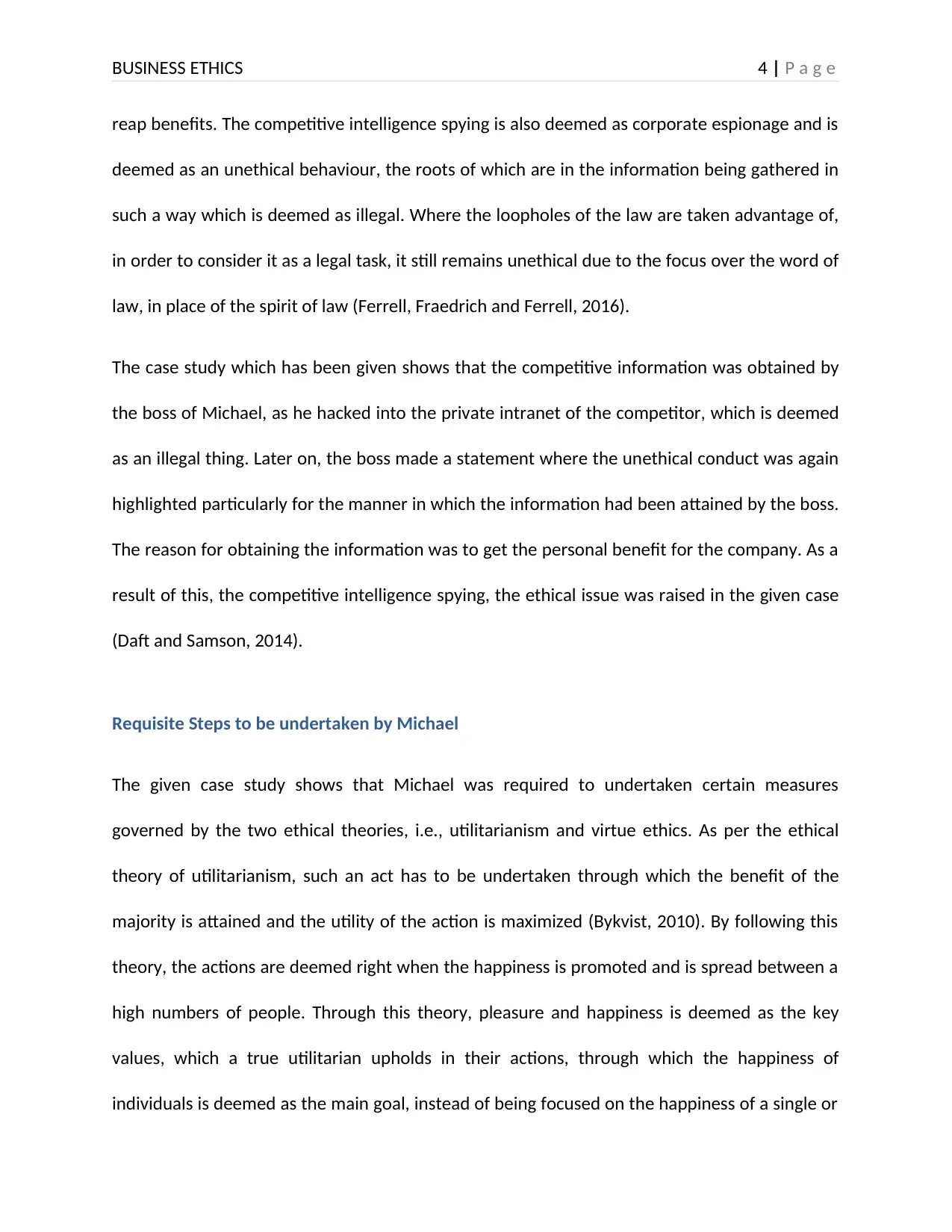
BUSINESS ETHICS 4 | P a g e
reap benefits. The competitive intelligence spying is also deemed as corporate espionage and is
deemed as an unethical behaviour, the roots of which are in the information being gathered in
such a way which is deemed as illegal. Where the loopholes of the law are taken advantage of,
in order to consider it as a legal task, it still remains unethical due to the focus over the word of
law, in place of the spirit of law (Ferrell, Fraedrich and Ferrell, 2016).
The case study which has been given shows that the competitive information was obtained by
the boss of Michael, as he hacked into the private intranet of the competitor, which is deemed
as an illegal thing. Later on, the boss made a statement where the unethical conduct was again
highlighted particularly for the manner in which the information had been attained by the boss.
The reason for obtaining the information was to get the personal benefit for the company. As a
result of this, the competitive intelligence spying, the ethical issue was raised in the given case
(Daft and Samson, 2014).
Requisite Steps to be undertaken by Michael
The given case study shows that Michael was required to undertaken certain measures
governed by the two ethical theories, i.e., utilitarianism and virtue ethics. As per the ethical
theory of utilitarianism, such an act has to be undertaken through which the benefit of the
majority is attained and the utility of the action is maximized (Bykvist, 2010). By following this
theory, the actions are deemed right when the happiness is promoted and is spread between a
high numbers of people. Through this theory, pleasure and happiness is deemed as the key
values, which a true utilitarian upholds in their actions, through which the happiness of
individuals is deemed as the main goal, instead of being focused on the happiness of a single or
reap benefits. The competitive intelligence spying is also deemed as corporate espionage and is
deemed as an unethical behaviour, the roots of which are in the information being gathered in
such a way which is deemed as illegal. Where the loopholes of the law are taken advantage of,
in order to consider it as a legal task, it still remains unethical due to the focus over the word of
law, in place of the spirit of law (Ferrell, Fraedrich and Ferrell, 2016).
The case study which has been given shows that the competitive information was obtained by
the boss of Michael, as he hacked into the private intranet of the competitor, which is deemed
as an illegal thing. Later on, the boss made a statement where the unethical conduct was again
highlighted particularly for the manner in which the information had been attained by the boss.
The reason for obtaining the information was to get the personal benefit for the company. As a
result of this, the competitive intelligence spying, the ethical issue was raised in the given case
(Daft and Samson, 2014).
Requisite Steps to be undertaken by Michael
The given case study shows that Michael was required to undertaken certain measures
governed by the two ethical theories, i.e., utilitarianism and virtue ethics. As per the ethical
theory of utilitarianism, such an act has to be undertaken through which the benefit of the
majority is attained and the utility of the action is maximized (Bykvist, 2010). By following this
theory, the actions are deemed right when the happiness is promoted and is spread between a
high numbers of people. Through this theory, pleasure and happiness is deemed as the key
values, which a true utilitarian upholds in their actions, through which the happiness of
individuals is deemed as the main goal, instead of being focused on the happiness of a single or
Paraphrase This Document
Need a fresh take? Get an instant paraphrase of this document with our AI Paraphraser
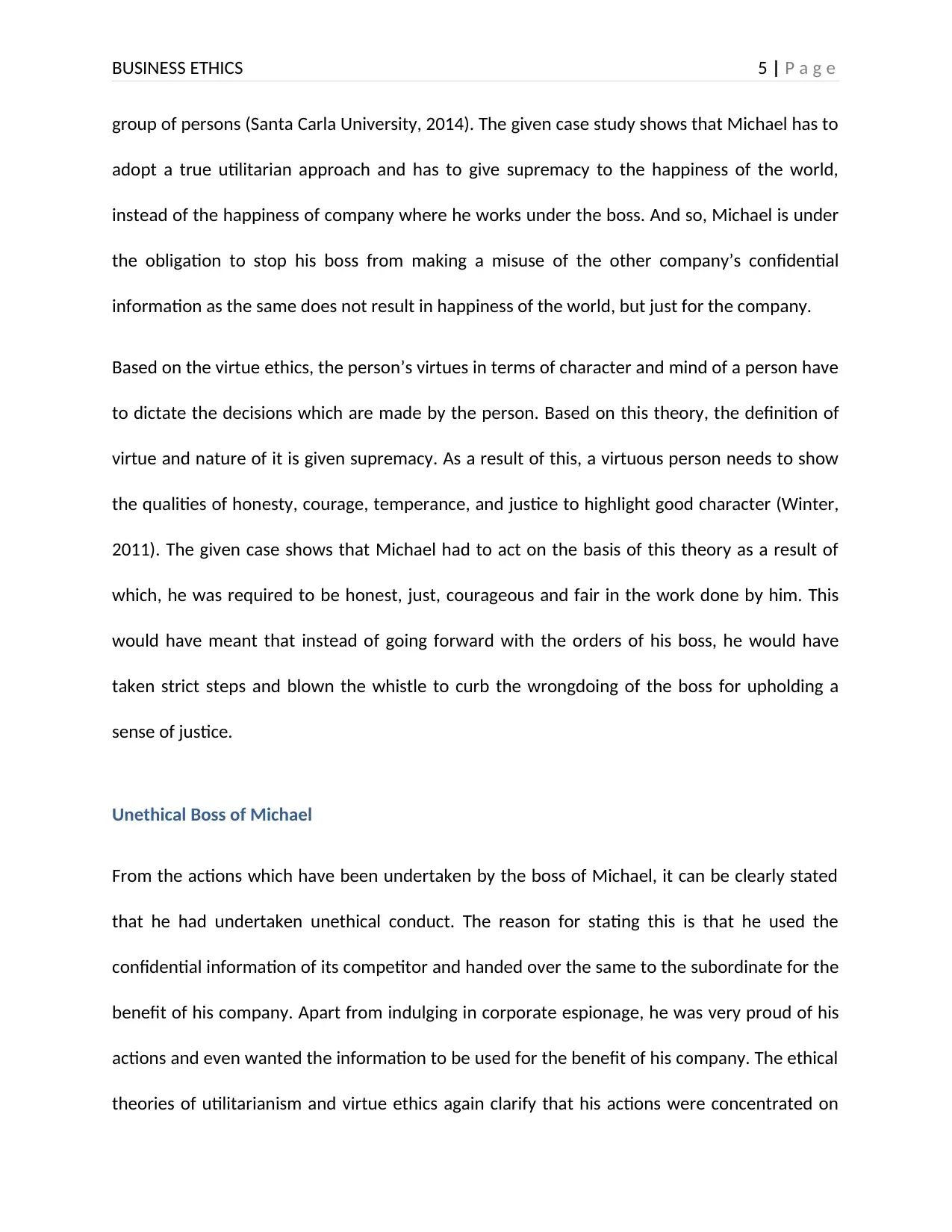
BUSINESS ETHICS 5 | P a g e
group of persons (Santa Carla University, 2014). The given case study shows that Michael has to
adopt a true utilitarian approach and has to give supremacy to the happiness of the world,
instead of the happiness of company where he works under the boss. And so, Michael is under
the obligation to stop his boss from making a misuse of the other company’s confidential
information as the same does not result in happiness of the world, but just for the company.
Based on the virtue ethics, the person’s virtues in terms of character and mind of a person have
to dictate the decisions which are made by the person. Based on this theory, the definition of
virtue and nature of it is given supremacy. As a result of this, a virtuous person needs to show
the qualities of honesty, courage, temperance, and justice to highlight good character (Winter,
2011). The given case shows that Michael had to act on the basis of this theory as a result of
which, he was required to be honest, just, courageous and fair in the work done by him. This
would have meant that instead of going forward with the orders of his boss, he would have
taken strict steps and blown the whistle to curb the wrongdoing of the boss for upholding a
sense of justice.
Unethical Boss of Michael
From the actions which have been undertaken by the boss of Michael, it can be clearly stated
that he had undertaken unethical conduct. The reason for stating this is that he used the
confidential information of its competitor and handed over the same to the subordinate for the
benefit of his company. Apart from indulging in corporate espionage, he was very proud of his
actions and even wanted the information to be used for the benefit of his company. The ethical
theories of utilitarianism and virtue ethics again clarify that his actions were concentrated on
group of persons (Santa Carla University, 2014). The given case study shows that Michael has to
adopt a true utilitarian approach and has to give supremacy to the happiness of the world,
instead of the happiness of company where he works under the boss. And so, Michael is under
the obligation to stop his boss from making a misuse of the other company’s confidential
information as the same does not result in happiness of the world, but just for the company.
Based on the virtue ethics, the person’s virtues in terms of character and mind of a person have
to dictate the decisions which are made by the person. Based on this theory, the definition of
virtue and nature of it is given supremacy. As a result of this, a virtuous person needs to show
the qualities of honesty, courage, temperance, and justice to highlight good character (Winter,
2011). The given case shows that Michael had to act on the basis of this theory as a result of
which, he was required to be honest, just, courageous and fair in the work done by him. This
would have meant that instead of going forward with the orders of his boss, he would have
taken strict steps and blown the whistle to curb the wrongdoing of the boss for upholding a
sense of justice.
Unethical Boss of Michael
From the actions which have been undertaken by the boss of Michael, it can be clearly stated
that he had undertaken unethical conduct. The reason for stating this is that he used the
confidential information of its competitor and handed over the same to the subordinate for the
benefit of his company. Apart from indulging in corporate espionage, he was very proud of his
actions and even wanted the information to be used for the benefit of his company. The ethical
theories of utilitarianism and virtue ethics again clarify that his actions were concentrated on
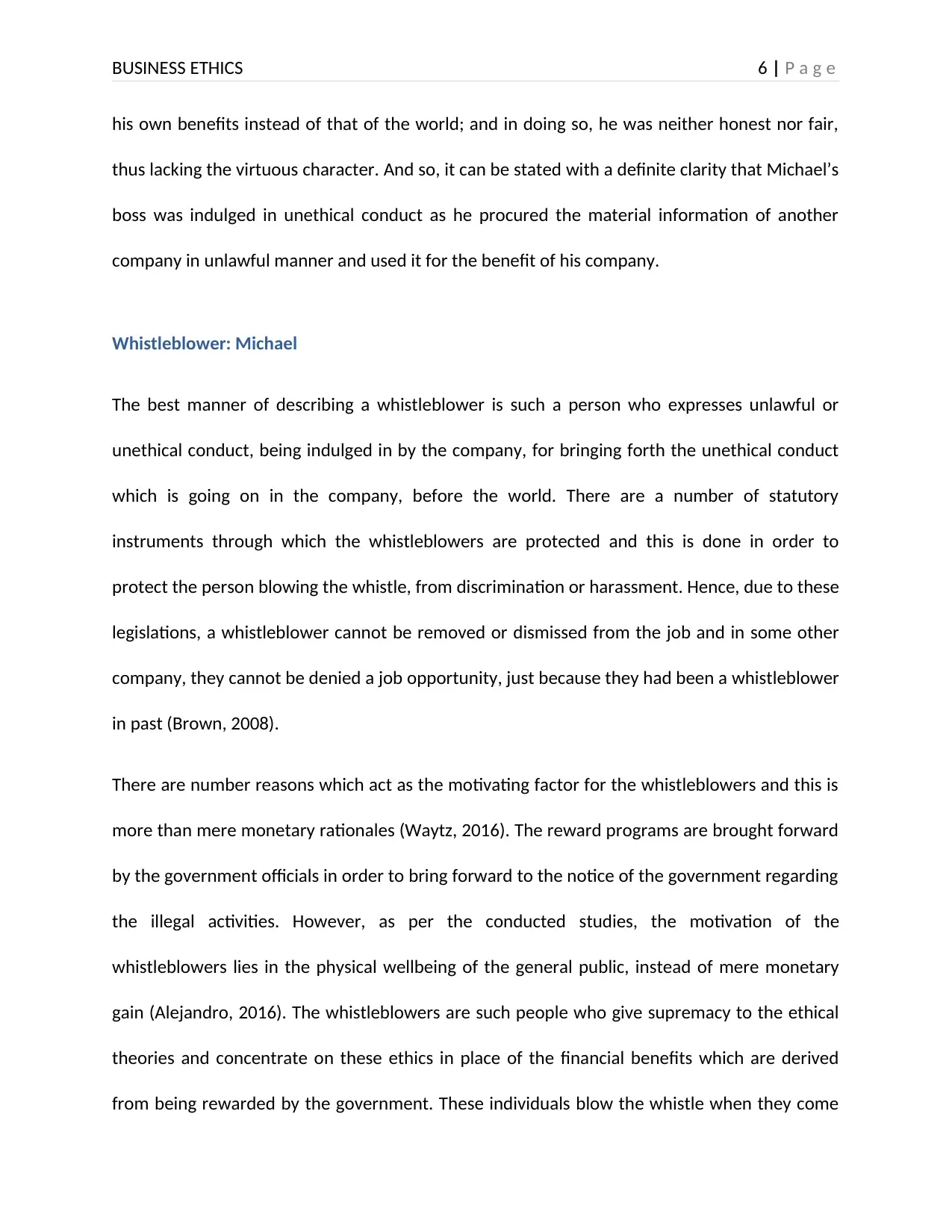
BUSINESS ETHICS 6 | P a g e
his own benefits instead of that of the world; and in doing so, he was neither honest nor fair,
thus lacking the virtuous character. And so, it can be stated with a definite clarity that Michael’s
boss was indulged in unethical conduct as he procured the material information of another
company in unlawful manner and used it for the benefit of his company.
Whistleblower: Michael
The best manner of describing a whistleblower is such a person who expresses unlawful or
unethical conduct, being indulged in by the company, for bringing forth the unethical conduct
which is going on in the company, before the world. There are a number of statutory
instruments through which the whistleblowers are protected and this is done in order to
protect the person blowing the whistle, from discrimination or harassment. Hence, due to these
legislations, a whistleblower cannot be removed or dismissed from the job and in some other
company, they cannot be denied a job opportunity, just because they had been a whistleblower
in past (Brown, 2008).
There are number reasons which act as the motivating factor for the whistleblowers and this is
more than mere monetary rationales (Waytz, 2016). The reward programs are brought forward
by the government officials in order to bring forward to the notice of the government regarding
the illegal activities. However, as per the conducted studies, the motivation of the
whistleblowers lies in the physical wellbeing of the general public, instead of mere monetary
gain (Alejandro, 2016). The whistleblowers are such people who give supremacy to the ethical
theories and concentrate on these ethics in place of the financial benefits which are derived
from being rewarded by the government. These individuals blow the whistle when they come
his own benefits instead of that of the world; and in doing so, he was neither honest nor fair,
thus lacking the virtuous character. And so, it can be stated with a definite clarity that Michael’s
boss was indulged in unethical conduct as he procured the material information of another
company in unlawful manner and used it for the benefit of his company.
Whistleblower: Michael
The best manner of describing a whistleblower is such a person who expresses unlawful or
unethical conduct, being indulged in by the company, for bringing forth the unethical conduct
which is going on in the company, before the world. There are a number of statutory
instruments through which the whistleblowers are protected and this is done in order to
protect the person blowing the whistle, from discrimination or harassment. Hence, due to these
legislations, a whistleblower cannot be removed or dismissed from the job and in some other
company, they cannot be denied a job opportunity, just because they had been a whistleblower
in past (Brown, 2008).
There are number reasons which act as the motivating factor for the whistleblowers and this is
more than mere monetary rationales (Waytz, 2016). The reward programs are brought forward
by the government officials in order to bring forward to the notice of the government regarding
the illegal activities. However, as per the conducted studies, the motivation of the
whistleblowers lies in the physical wellbeing of the general public, instead of mere monetary
gain (Alejandro, 2016). The whistleblowers are such people who give supremacy to the ethical
theories and concentrate on these ethics in place of the financial benefits which are derived
from being rewarded by the government. These individuals blow the whistle when they come
⊘ This is a preview!⊘
Do you want full access?
Subscribe today to unlock all pages.

Trusted by 1+ million students worldwide
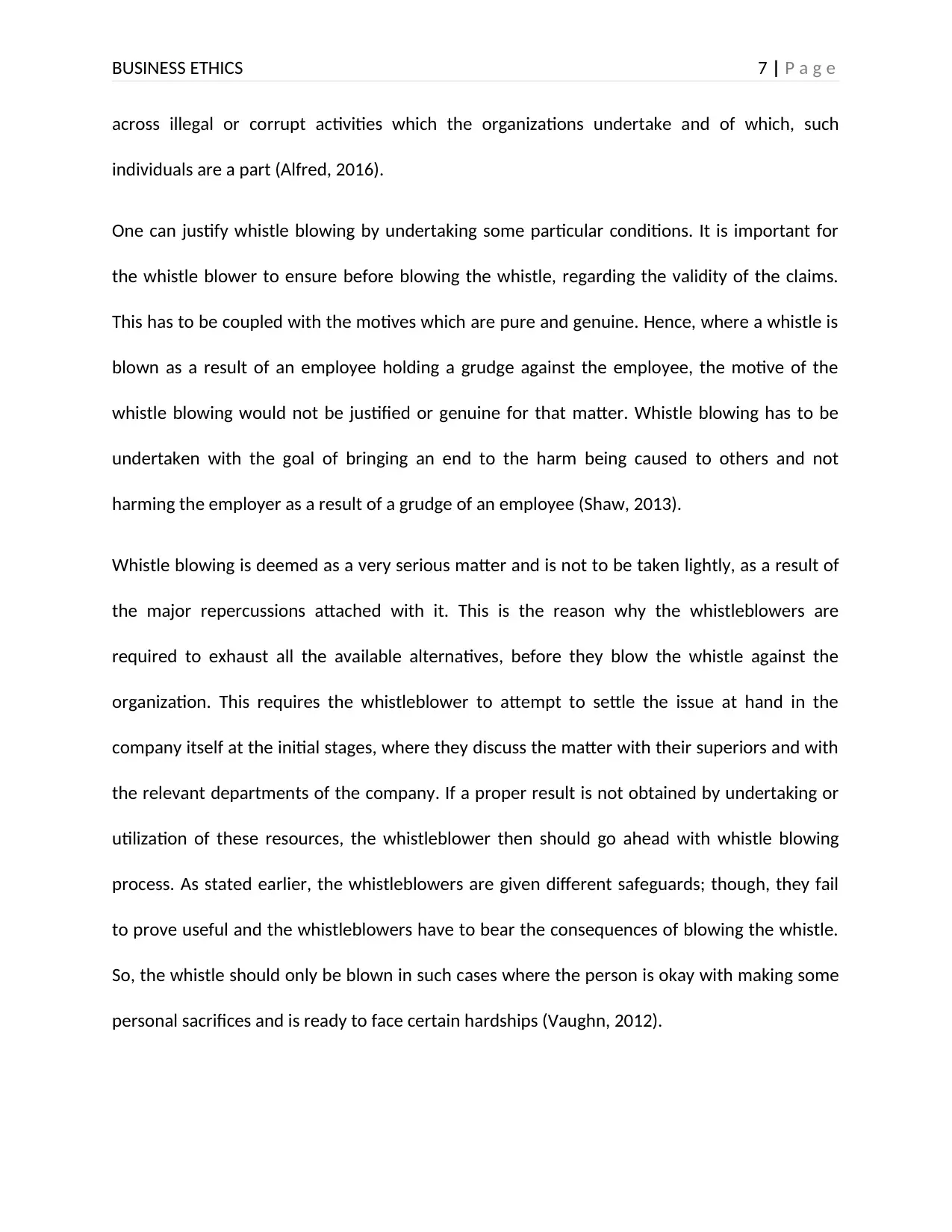
BUSINESS ETHICS 7 | P a g e
across illegal or corrupt activities which the organizations undertake and of which, such
individuals are a part (Alfred, 2016).
One can justify whistle blowing by undertaking some particular conditions. It is important for
the whistle blower to ensure before blowing the whistle, regarding the validity of the claims.
This has to be coupled with the motives which are pure and genuine. Hence, where a whistle is
blown as a result of an employee holding a grudge against the employee, the motive of the
whistle blowing would not be justified or genuine for that matter. Whistle blowing has to be
undertaken with the goal of bringing an end to the harm being caused to others and not
harming the employer as a result of a grudge of an employee (Shaw, 2013).
Whistle blowing is deemed as a very serious matter and is not to be taken lightly, as a result of
the major repercussions attached with it. This is the reason why the whistleblowers are
required to exhaust all the available alternatives, before they blow the whistle against the
organization. This requires the whistleblower to attempt to settle the issue at hand in the
company itself at the initial stages, where they discuss the matter with their superiors and with
the relevant departments of the company. If a proper result is not obtained by undertaking or
utilization of these resources, the whistleblower then should go ahead with whistle blowing
process. As stated earlier, the whistleblowers are given different safeguards; though, they fail
to prove useful and the whistleblowers have to bear the consequences of blowing the whistle.
So, the whistle should only be blown in such cases where the person is okay with making some
personal sacrifices and is ready to face certain hardships (Vaughn, 2012).
across illegal or corrupt activities which the organizations undertake and of which, such
individuals are a part (Alfred, 2016).
One can justify whistle blowing by undertaking some particular conditions. It is important for
the whistle blower to ensure before blowing the whistle, regarding the validity of the claims.
This has to be coupled with the motives which are pure and genuine. Hence, where a whistle is
blown as a result of an employee holding a grudge against the employee, the motive of the
whistle blowing would not be justified or genuine for that matter. Whistle blowing has to be
undertaken with the goal of bringing an end to the harm being caused to others and not
harming the employer as a result of a grudge of an employee (Shaw, 2013).
Whistle blowing is deemed as a very serious matter and is not to be taken lightly, as a result of
the major repercussions attached with it. This is the reason why the whistleblowers are
required to exhaust all the available alternatives, before they blow the whistle against the
organization. This requires the whistleblower to attempt to settle the issue at hand in the
company itself at the initial stages, where they discuss the matter with their superiors and with
the relevant departments of the company. If a proper result is not obtained by undertaking or
utilization of these resources, the whistleblower then should go ahead with whistle blowing
process. As stated earlier, the whistleblowers are given different safeguards; though, they fail
to prove useful and the whistleblowers have to bear the consequences of blowing the whistle.
So, the whistle should only be blown in such cases where the person is okay with making some
personal sacrifices and is ready to face certain hardships (Vaughn, 2012).
Paraphrase This Document
Need a fresh take? Get an instant paraphrase of this document with our AI Paraphraser
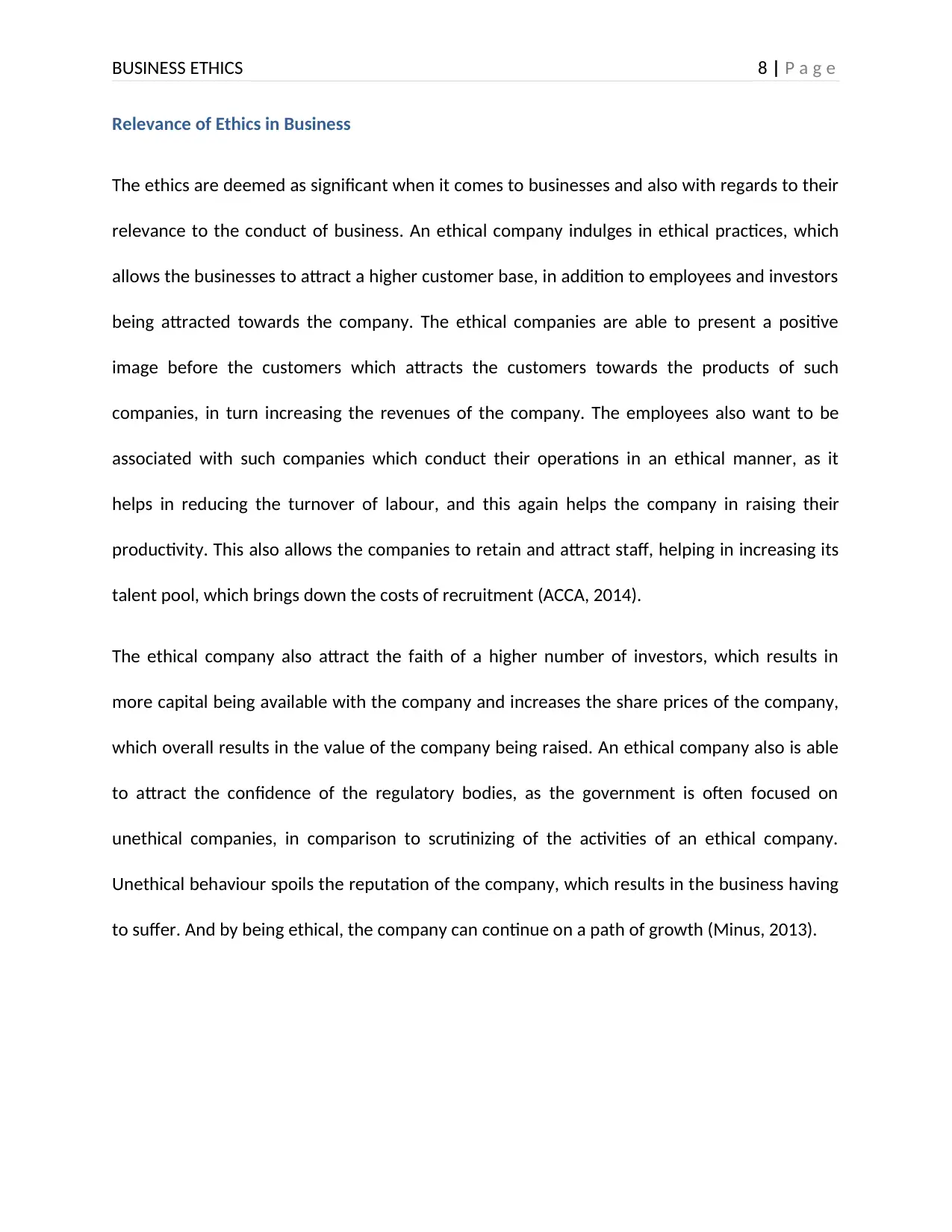
BUSINESS ETHICS 8 | P a g e
Relevance of Ethics in Business
The ethics are deemed as significant when it comes to businesses and also with regards to their
relevance to the conduct of business. An ethical company indulges in ethical practices, which
allows the businesses to attract a higher customer base, in addition to employees and investors
being attracted towards the company. The ethical companies are able to present a positive
image before the customers which attracts the customers towards the products of such
companies, in turn increasing the revenues of the company. The employees also want to be
associated with such companies which conduct their operations in an ethical manner, as it
helps in reducing the turnover of labour, and this again helps the company in raising their
productivity. This also allows the companies to retain and attract staff, helping in increasing its
talent pool, which brings down the costs of recruitment (ACCA, 2014).
The ethical company also attract the faith of a higher number of investors, which results in
more capital being available with the company and increases the share prices of the company,
which overall results in the value of the company being raised. An ethical company also is able
to attract the confidence of the regulatory bodies, as the government is often focused on
unethical companies, in comparison to scrutinizing of the activities of an ethical company.
Unethical behaviour spoils the reputation of the company, which results in the business having
to suffer. And by being ethical, the company can continue on a path of growth (Minus, 2013).
Relevance of Ethics in Business
The ethics are deemed as significant when it comes to businesses and also with regards to their
relevance to the conduct of business. An ethical company indulges in ethical practices, which
allows the businesses to attract a higher customer base, in addition to employees and investors
being attracted towards the company. The ethical companies are able to present a positive
image before the customers which attracts the customers towards the products of such
companies, in turn increasing the revenues of the company. The employees also want to be
associated with such companies which conduct their operations in an ethical manner, as it
helps in reducing the turnover of labour, and this again helps the company in raising their
productivity. This also allows the companies to retain and attract staff, helping in increasing its
talent pool, which brings down the costs of recruitment (ACCA, 2014).
The ethical company also attract the faith of a higher number of investors, which results in
more capital being available with the company and increases the share prices of the company,
which overall results in the value of the company being raised. An ethical company also is able
to attract the confidence of the regulatory bodies, as the government is often focused on
unethical companies, in comparison to scrutinizing of the activities of an ethical company.
Unethical behaviour spoils the reputation of the company, which results in the business having
to suffer. And by being ethical, the company can continue on a path of growth (Minus, 2013).
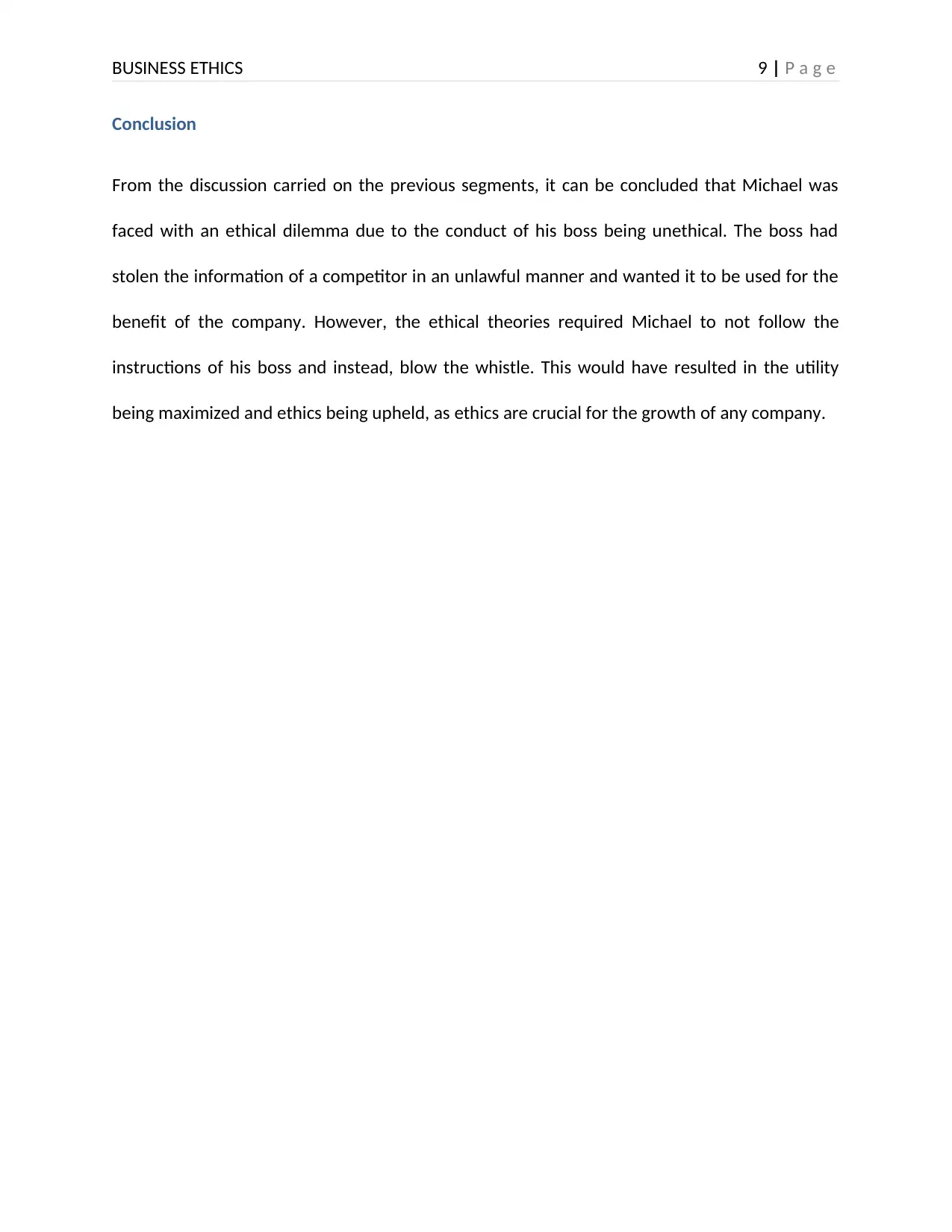
BUSINESS ETHICS 9 | P a g e
Conclusion
From the discussion carried on the previous segments, it can be concluded that Michael was
faced with an ethical dilemma due to the conduct of his boss being unethical. The boss had
stolen the information of a competitor in an unlawful manner and wanted it to be used for the
benefit of the company. However, the ethical theories required Michael to not follow the
instructions of his boss and instead, blow the whistle. This would have resulted in the utility
being maximized and ethics being upheld, as ethics are crucial for the growth of any company.
Conclusion
From the discussion carried on the previous segments, it can be concluded that Michael was
faced with an ethical dilemma due to the conduct of his boss being unethical. The boss had
stolen the information of a competitor in an unlawful manner and wanted it to be used for the
benefit of the company. However, the ethical theories required Michael to not follow the
instructions of his boss and instead, blow the whistle. This would have resulted in the utility
being maximized and ethics being upheld, as ethics are crucial for the growth of any company.
⊘ This is a preview!⊘
Do you want full access?
Subscribe today to unlock all pages.

Trusted by 1+ million students worldwide
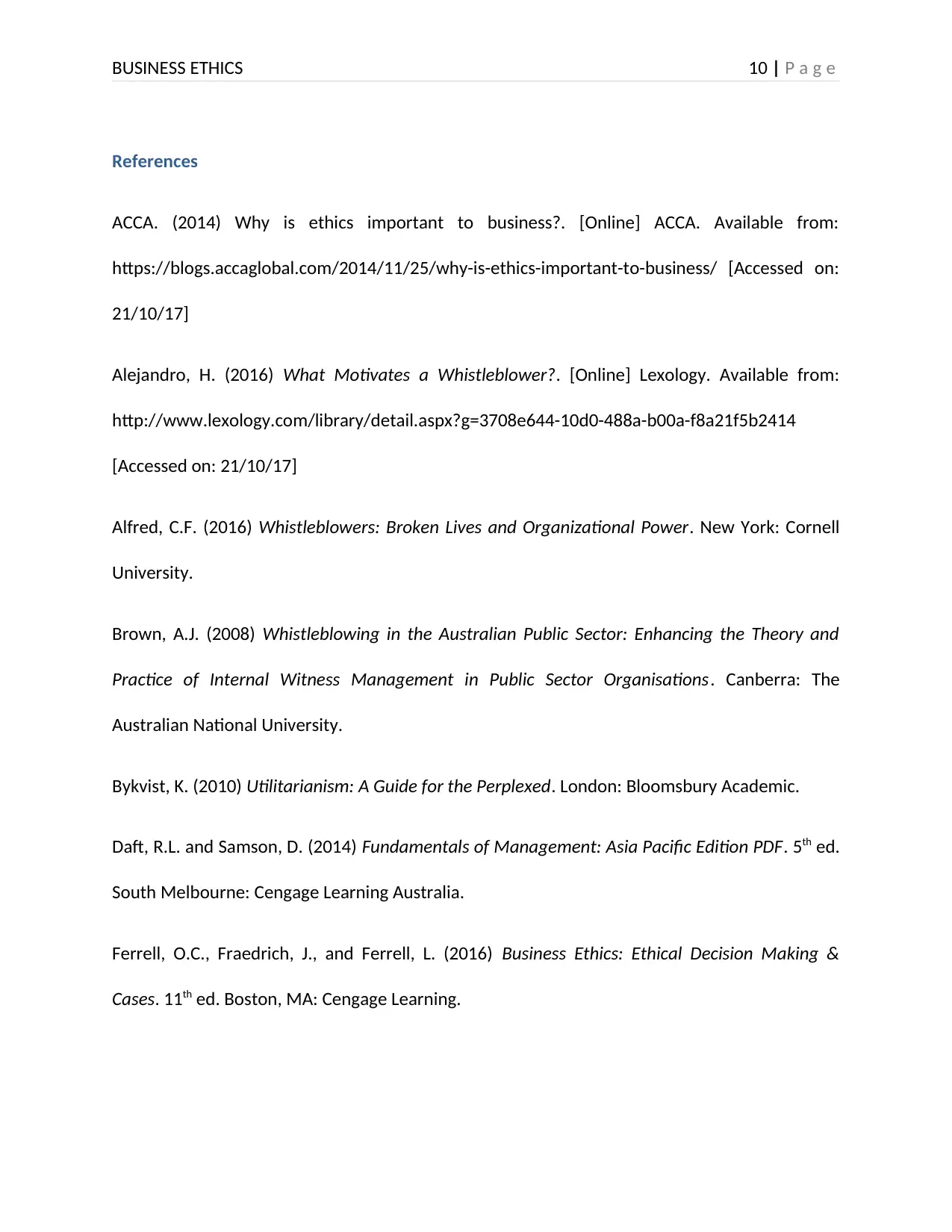
BUSINESS ETHICS 10 | P a g e
References
ACCA. (2014) Why is ethics important to business?. [Online] ACCA. Available from:
https://blogs.accaglobal.com/2014/11/25/why-is-ethics-important-to-business/ [Accessed on:
21/10/17]
Alejandro, H. (2016) What Motivates a Whistleblower?. [Online] Lexology. Available from:
http://www.lexology.com/library/detail.aspx?g=3708e644-10d0-488a-b00a-f8a21f5b2414
[Accessed on: 21/10/17]
Alfred, C.F. (2016) Whistleblowers: Broken Lives and Organizational Power. New York: Cornell
University.
Brown, A.J. (2008) Whistleblowing in the Australian Public Sector: Enhancing the Theory and
Practice of Internal Witness Management in Public Sector Organisations. Canberra: The
Australian National University.
Bykvist, K. (2010) Utilitarianism: A Guide for the Perplexed. London: Bloomsbury Academic.
Daft, R.L. and Samson, D. (2014) Fundamentals of Management: Asia Pacific Edition PDF. 5th ed.
South Melbourne: Cengage Learning Australia.
Ferrell, O.C., Fraedrich, J., and Ferrell, L. (2016) Business Ethics: Ethical Decision Making &
Cases. 11th ed. Boston, MA: Cengage Learning.
References
ACCA. (2014) Why is ethics important to business?. [Online] ACCA. Available from:
https://blogs.accaglobal.com/2014/11/25/why-is-ethics-important-to-business/ [Accessed on:
21/10/17]
Alejandro, H. (2016) What Motivates a Whistleblower?. [Online] Lexology. Available from:
http://www.lexology.com/library/detail.aspx?g=3708e644-10d0-488a-b00a-f8a21f5b2414
[Accessed on: 21/10/17]
Alfred, C.F. (2016) Whistleblowers: Broken Lives and Organizational Power. New York: Cornell
University.
Brown, A.J. (2008) Whistleblowing in the Australian Public Sector: Enhancing the Theory and
Practice of Internal Witness Management in Public Sector Organisations. Canberra: The
Australian National University.
Bykvist, K. (2010) Utilitarianism: A Guide for the Perplexed. London: Bloomsbury Academic.
Daft, R.L. and Samson, D. (2014) Fundamentals of Management: Asia Pacific Edition PDF. 5th ed.
South Melbourne: Cengage Learning Australia.
Ferrell, O.C., Fraedrich, J., and Ferrell, L. (2016) Business Ethics: Ethical Decision Making &
Cases. 11th ed. Boston, MA: Cengage Learning.
Paraphrase This Document
Need a fresh take? Get an instant paraphrase of this document with our AI Paraphraser
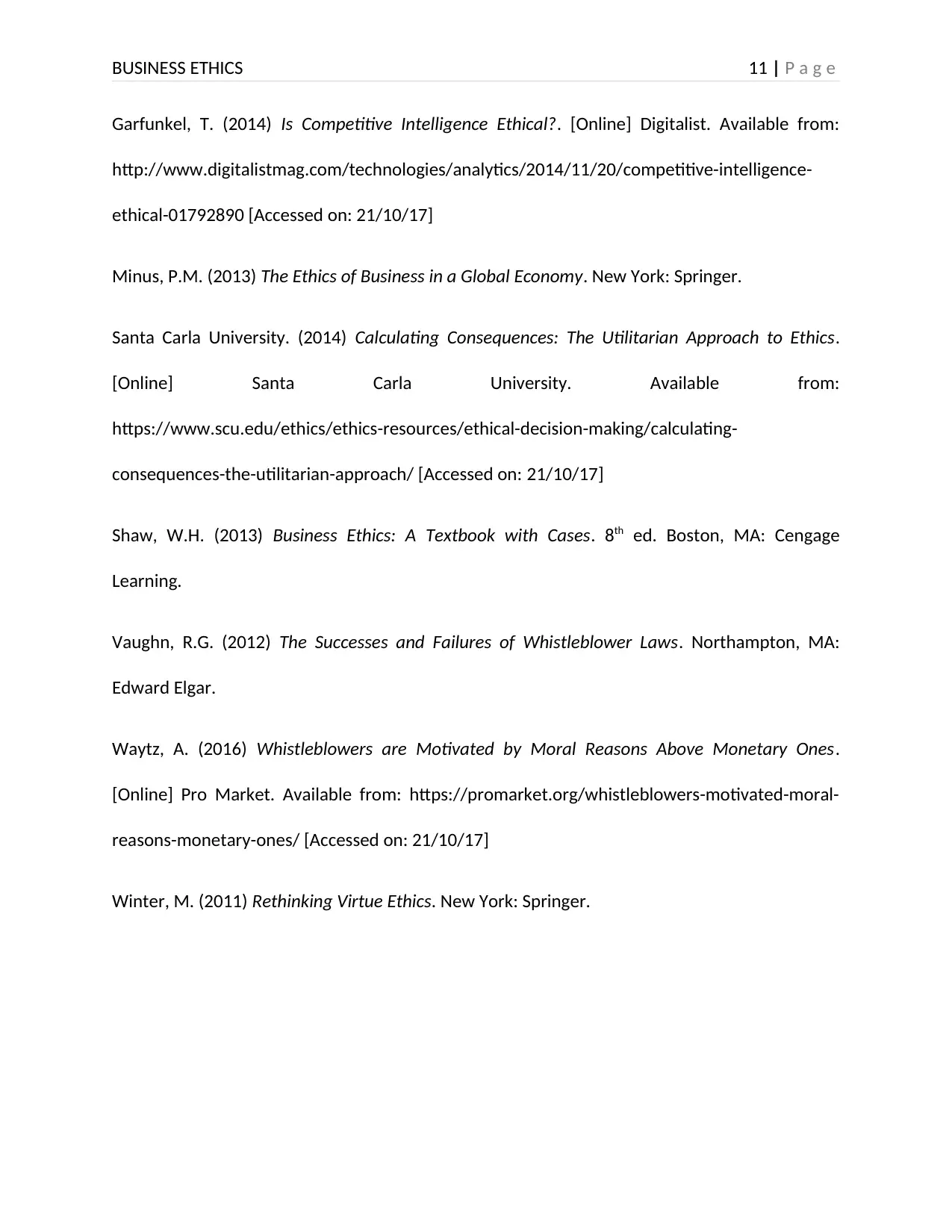
BUSINESS ETHICS 11 | P a g e
Garfunkel, T. (2014) Is Competitive Intelligence Ethical?. [Online] Digitalist. Available from:
http://www.digitalistmag.com/technologies/analytics/2014/11/20/competitive-intelligence-
ethical-01792890 [Accessed on: 21/10/17]
Minus, P.M. (2013) The Ethics of Business in a Global Economy. New York: Springer.
Santa Carla University. (2014) Calculating Consequences: The Utilitarian Approach to Ethics.
[Online] Santa Carla University. Available from:
https://www.scu.edu/ethics/ethics-resources/ethical-decision-making/calculating-
consequences-the-utilitarian-approach/ [Accessed on: 21/10/17]
Shaw, W.H. (2013) Business Ethics: A Textbook with Cases. 8th ed. Boston, MA: Cengage
Learning.
Vaughn, R.G. (2012) The Successes and Failures of Whistleblower Laws. Northampton, MA:
Edward Elgar.
Waytz, A. (2016) Whistleblowers are Motivated by Moral Reasons Above Monetary Ones.
[Online] Pro Market. Available from: https://promarket.org/whistleblowers-motivated-moral-
reasons-monetary-ones/ [Accessed on: 21/10/17]
Winter, M. (2011) Rethinking Virtue Ethics. New York: Springer.
Garfunkel, T. (2014) Is Competitive Intelligence Ethical?. [Online] Digitalist. Available from:
http://www.digitalistmag.com/technologies/analytics/2014/11/20/competitive-intelligence-
ethical-01792890 [Accessed on: 21/10/17]
Minus, P.M. (2013) The Ethics of Business in a Global Economy. New York: Springer.
Santa Carla University. (2014) Calculating Consequences: The Utilitarian Approach to Ethics.
[Online] Santa Carla University. Available from:
https://www.scu.edu/ethics/ethics-resources/ethical-decision-making/calculating-
consequences-the-utilitarian-approach/ [Accessed on: 21/10/17]
Shaw, W.H. (2013) Business Ethics: A Textbook with Cases. 8th ed. Boston, MA: Cengage
Learning.
Vaughn, R.G. (2012) The Successes and Failures of Whistleblower Laws. Northampton, MA:
Edward Elgar.
Waytz, A. (2016) Whistleblowers are Motivated by Moral Reasons Above Monetary Ones.
[Online] Pro Market. Available from: https://promarket.org/whistleblowers-motivated-moral-
reasons-monetary-ones/ [Accessed on: 21/10/17]
Winter, M. (2011) Rethinking Virtue Ethics. New York: Springer.
1 out of 11
Related Documents
Your All-in-One AI-Powered Toolkit for Academic Success.
+13062052269
info@desklib.com
Available 24*7 on WhatsApp / Email
![[object Object]](/_next/static/media/star-bottom.7253800d.svg)
Unlock your academic potential
Copyright © 2020–2026 A2Z Services. All Rights Reserved. Developed and managed by ZUCOL.



